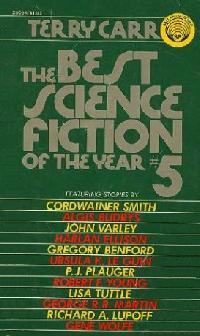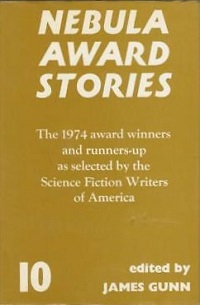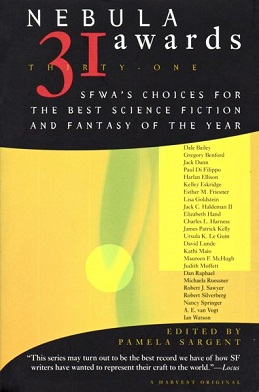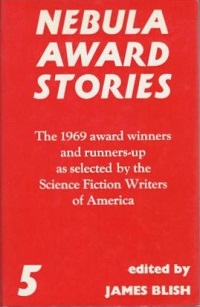Related Research Articles

Alice Bradley Sheldon was an American science fiction and fantasy author better known as James Tiptree Jr., a pen name she used from 1967 until her death. It was not publicly known until 1977 that James Tiptree Jr. was a woman. From 1974 to 1985 she also occasionally used the pen name Raccoona Sheldon. Tiptree was inducted into the Science Fiction Hall of Fame in 2012.

Ursula Kroeber Le Guin was an American author best known for her works of speculative fiction, including science fiction works set in her Hainish universe, and the Earthsea fantasy series. She was first published in 1959, and her literary career spanned nearly sixty years, producing more than twenty novels and over a hundred short stories, in addition to poetry, literary criticism, translations, and children's books. Frequently described as an author of science fiction, Le Guin has also been called a "major voice in American Letters". Le Guin said she would prefer to be known as an "American novelist".
The Bicentennial Man is a novelette in the Robot series by American writer Isaac Asimov. According to the foreword in Robot Visions, Asimov was approached to write a story, along with a number of other authors who would do the same, for a science fiction collection to be published in honor of the United States Bicentennial. However, the arrangement fell through, leaving Asimov's the only story actually completed for the project. Asimov sold the story to Judy-Lynn del Rey, who made some small changes to the text. Asimov restored the original text when the story was collected in The Bicentennial Man and Other Stories (1976).
Orsinian Tales is a collection of eleven short stories by American writer Ursula K. Le Guin, most of them set in the imaginary country of Orsinia.
The Nebula Award for Best Novelette is given each year by the Science Fiction and Fantasy Writers Association (SFWA) to a science fiction or fantasy novelette. A work of fiction is defined by the organization as a novelette if it is between 7,500 and 17,500 words; awards are also given out for pieces of longer lengths in the Novel and Novella categories, and for shorter lengths in the Short Story category. To be eligible for Nebula Award consideration a novelette must be published in English in the United States. Works published in English elsewhere in the world are also eligible provided they are released on either a website or in an electronic edition. The Nebula Award for Best Novelette has been awarded annually since 1966. The Nebula Awards have been described as one of "the most important of the American science fiction awards" and "the science-fiction and fantasy equivalent" of the Emmy Awards.

Malafrena is a 1979 novel by Ursula K. Le Guin. The only fantastic element of this novel is that it takes place in the imaginary Central European country of Orsinia, which is also the setting of her collection Orsinian Tales.

The Wind's Twelve Quarters is a collection of short stories by American writer Ursula K. Le Guin, named after a line from A. E. Housman's A Shropshire Lad, and first published by Harper & Row in 1975. A retrospective of Le Guin's short stories, it collects 17 previously published pieces of speculative fiction. Four of these were the germs of novels she was to write later, and a few others shared connections to Le Guin novels. At least four stories are set in the Hainish Universe, and two others in Earthsea. Many stories share themes and motifs, including time and utopia: certain images and characters also recur, including isolated scholars or explorers seeking knowledge in a hostile world.

Michael Kandel is an American translator and author of science fiction.

The Compass Rose is a 1982 collection of short stories by American writer Ursula K. Le Guin, and illustrated by Anne Yvonne Gilbert in 1983. It is organized into sections on the theme of directions, though not strictly compass-related as the title implies.
Nine Lives is a 1968 science fiction novelette by Ursula K. Le Guin. Originally published in Playboy magazine, the story uses human cloning to explore perceptions of self and other. When it was published, Le Guin opted for publishing it under her initials rather than her name, as per Playboy's suggestion that a female author would make its readers "nervous". Le Guin has said
"It's not surprising that Playboy hadn't had its consciousness raised back then, but it is surprising to me to realize how thoughtlessly I went along with them. It was the first time I met with anything I understood as sexual prejudice, prejudice against me as a woman writer, from any editor or publisher; and it seemed so silly, so grotesque, that I failed to see that it was also important."
The 33rd World Science Fiction Convention (Worldcon), also known as Aussiecon, or Aussiecon One, was held on 14–17 August 1975 at the Southern Cross Hotel in Melbourne, Australia.

Ursula K. Le Guin (1929–2018) was an American author of speculative fiction, realistic fiction, non-fiction, screenplays, librettos, essays, poetry, speeches, translations, literary critiques, chapbooks, and children's fiction. She was primarily known for her works of speculative fiction. These include works set in the fictional world of Earthsea, stories in the Hainish Cycle, and standalone novels and short stories. Though frequently referred to as an author of science fiction, critics have described her work as being difficult to classify.

The Best Science Fiction of the Year #4 is an anthology of science fiction short stories edited by Terry Carr, the fourth volume in a series of sixteen. It was first published in paperback by Ballantine Books in July 1975, and reissued in October 1976. The first British edition was published in hardcover by Gollancz in September 1975.

The Best Science Fiction of the Year #5 is an anthology of science fiction short stories edited by Terry Carr, the fifth volume in a series of sixteen. It was first published in paperback by Ballantine Books in July 1976.

Nebula Award Stories 10 is an anthology of award-winning science fiction short works edited by James Gunn. It was first published in the United Kingdom in hardcover by Gollancz in November 1975. The first American edition was published in hardcover by Harper & Row in December of the same year. Paperback editions followed from Berkley Medallion in the U.S. in December 1976, and Corgi in the U.K. in June 1977. The American editions bore the variant title Nebula Award Stories Ten. The book has also been published in German.

Nebula Award Stories 11 is an anthology of science fiction short works edited by Ursula K. Le Guin. It was first published in the United Kingdom in hardcover by Gollancz in November 1976. The first American edition was published in hardcover by Harper & Row in February 1977. Paperback editions followed from Corgi in the U.K. in July 1978, and Bantam Books in the U.S. in August 1978. The American editions bore the variant title Nebula Award Stories Eleven.

Nebula Awards 31 is an anthology of science fiction short works edited by Pamela Sargent, the third of three successive volumes under her editorship. It was first published in hardcover and trade paperback by Harcourt Brace in April 1997, and reprinted in trade paperback in July 1999.

Nebula Award Stories 5 is an anthology of award-winning science fiction short works edited by James Blish. It was first published in the United Kingdom in hardcover by Gollancz in November 1970. The first American edition was published by Doubleday in December of the same year. Paperback editions followed from Pocket Books in the U.S. in January 1972, and Panther in the U.K. in December 1972. The American editions bore the variant title Nebula Award Stories Five. The book has also been published in German.

Nebula Awards Showcase 2004 is an anthology of award-winning science fiction short works edited by Vonda N. McIntyre. It was first published in trade paperback by Roc/New American Library in March 2004.

R. B. Lemberg is a queer, bigender, and autistic Ukrainian-American author, poet, and editor of speculative fiction. Their work has appeared in publications such as Lightspeed, Strange Horizons, Beneath Ceaseless Skies, Sisters of the Revolution: A Feminist Speculative Fiction Anthology, Uncanny Magazine, and Transcendent 3: The Year's Best Transgender Speculative Fiction 2017.
References
- 1 2 Future Power publication contents at the Internet Speculative Fiction Database
- 1 2 "Ursula K Le Guin - The Diary of the Rose", BBC Radio (retrieved January 28, 2020)
- ↑ American Literature Ursula K. Le Guin, by Sandra J. Lindow @ Oxford Bibliographies
- 1 2 Where on Earth publication contents at the Internet Speculative Fiction Database
- 1 2 3 As cited in: The Diary of the Rose title listing at the Internet Speculative Fiction Database
- ↑ "The Unreal and the Real: Selected Stories of Ursula K. Le Guin, reviewed by Eugene Reynolds"
- ↑ An Interview with Ursula K. Le Guin, Ramola D | October/November 2003
- ↑ Reginald, R. (September 2010). Science Fiction and Fantasy Literature. Wildside Press LLC. p. 768. ISBN 9780941028769.
- ↑ Award Years for Locus Poll Award : 1977
- ↑ Award Years for Hugo Award: 1977
- 1 2 Le Guin, Ursula (December 6, 2017). "The Literary Prize for the Refusal of Literary Prizes". The Paris Review . Retrieved December 25, 2018.
- ↑ Dugdale, John (May 21, 2016). "How to turn down a prestigious literary prize – a winner's guide to etiquette". The Guardian . Retrieved December 25, 2018.
- ↑ "Nebula Awards 1977". Science Fiction Awards Database . Archived from the original on 2015-10-25. Retrieved 2021-12-10.
- ↑ "Best Science Fiction Stories of the Year: Sixth Annual Collection, edited by Gardner Dozois, 1977", a review at SF Magazines
- ↑ The Compass Rose, Stories by Ursula K. Le Guin, Kirkus Reviews, July 1st, 1982, posted online Sept. 27th, 2011
- ↑ "A Matter of Perspective: The Unreal and the Real by Ursula K. Le Guin", Em Nordling, December 27, 2016
- ↑ Урсула Ле Гуин Роза ветров, collection description at fantlab.ru